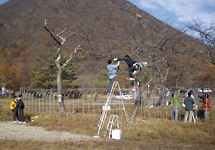- Home »
- Community Voices
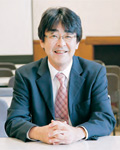
Community Collaboration Office, Sawatari Spa Hospital
Gunma Medical Association Social Worker
Obtain solutions for issues in life of people with various backgrounds
We, social workers provide consultation and support for various issues in life from a standpoint of
social welfare and attempt to accomplish harmony between humans and environments. Among those
people with issues in life, foreigners are also included and "Multicultural Coexistence" is becoming
a close topic for social workers.
In 2008, we were asked to help open the "Multicultural Community Social Worker Training
Program" for social workers in the prefecture by the Department of Citizens and Culture,
International Affairs Division, Gunma Prefecture. Professional associations for social workers such
as "Gunma Prefecture Medical Social Worker Association" to which I belong, "Gunma Association
of Certified Social Workers" and "Gunma Association of Psychiatric Social Workers" have
cooperated with each other and worked on this program. In the three year project, 44 multicultural
social workers have finished the program and are working by themselves at medical institutions,
social organizations, social welfare institutions, or communities where they belong to.
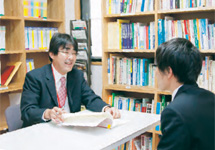
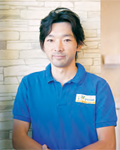
Representative
Bridges between Japan and foreign countries in the international society
I am a third generation Japanese Brazilian and came to Japan in 1989 for my father's job. After
amendments to the immigration law, Japan became closer to Japanese Brazilian people than before.
This can be seen especially in the technology parks of in Ohata City and Oizumi Town in Gunma
Prefecture, where a number of Brazilian people live. Twenty years after the migrant boom now,
multicultural community has become an unavoidable topic.
What could we do for the areas where many foreigners live in? It sounds like multicultural
coexistence society is a difficult term, but implementation of the idea is even more difficult than the
word itself. A good analogy for it is international marriage. If two people with different cultures try
to accept each custom, respect each other and live together, accumulation of miniscule things
sometimes lead to conflicts between them. However, we can learn a lot of things from this.
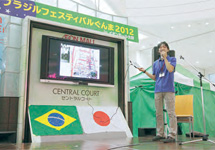
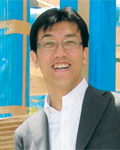
Multicultural Center Osaka
Specified non-profit corporation
Multicultural coexistence is an essential item for the future of our community
The issues in multicultural coexistence with foreign residents are changing from short-term guest
workers to permanent residents. Also, considering the low birth rate and an aging population in the
entire East Asia, update of population policy for sustainable communities is an urgent need. We
should work on "multicultural coexistence" as an essential task for the future of local communities.
This is not only for foreigners. For the administration, perspective in multicultural coexistence is
needed in employment and industrial policy and in terms of business, paying attention to foreigners
not only as human resources but customers, their possibility will be expanded.
I have high expectations for success of "Multicultural Community Advancement Officers" trained
in the program with classmates having various experiences and careers.
■Profile
In 2006, participated in planning of "Multicultural Community Advancement Plan" prepared by the Ministry of Internal Affairs and Communications. In 2011, appointed a Cabinet Secretariat Planning Officer. After working on the investigation of needs of the disaster areas and enforcement of policies for promotion of volunteers for the earthquake, from 2012, has worked as a Senior Director for General Policy of the Reconstruction Agency (non-full-time). In this project, is in charge of lectures of Consultant Course Basic Education "Practical Theories of Practical Advancement of Multicultural Living".
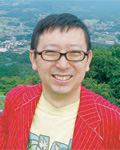
Valuable human training program important for the 21st Century
Recently people from various fields are calling for the necessity of "global human resources" in the
future. That is understandable, but occasionally some people misunderstand experiences in living
overseas, and fluency in English, only as globalism. In today's Japan, an ability to live with people
having various origins and backgrounds such as "multicultural approaches" will be needed.
This "Multicultural Community Advancement Officer" training program is a valuable program that
provides the human resources needed in the 21st century. I want to say "BOA SORTE" meaning
"Good Luck" to all people working for this program and students.
■Profile
Born in Sao Paulo, Working as a journalist while researching immigrants in Brazil and Japan, taught "Study in Brazil for Multicultural Coexistence" for five years from the academic year 2005 in the Program for Promoting High-Quality University Education at Gunma University. Is in charge of the Analyst Course, "Conditions and Challenges in Multicultural Communities" in this program.
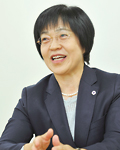
Activate communities through creation of livable social environment
Since I met Megumi Yuki, a professor at Faculty of Education, Gunma University in April, 2008, I became more aware of the importance of promotion of a multicultural coexistence society. At that time, International Affairs Division, Life and Culture Department, oversaw public administration related to foreigners, and discussed resolutions for health, medical services, welfare, education and jobs in foreigner inhabitation areas with concerned city offices and organizations. During that time, we received the appropriate support and guidance for health consultations with foreigners, and an aggressive approach to public education from Professor Yuki, so that we received the notice of other Prefectures.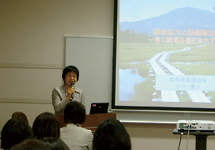
Gunma Nursing Association provides support and care for people in various life stages while providing high quality nursing services at any time anywhere as professional nurses so that their patients can live healthily and productive lives. I hope many people involved in health, medical services, as well as nursing services will participate in this training program.
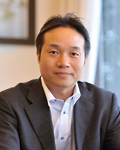
Haruna Tourist Association
Director
Spread "multicultural coexistence" from Gunma Prefecture
I came from a family of a Chinese businessman in the Zhejiang Province in China. I met my wife in France and came to Japan after getting married in 1994. After the collapse of the Bubble Economy, the number of tourists to Haruna Lake decreased and Haruna Lake stagnated, resulting in the youth leaving their hometown. Under these circumstances, I was involved in the local volunteer fire corps and a sightseeing organization, as I wanted to do whatever I could. Then, I established a new sightseeing project with a few local young people as a member of the community to attract tourists. Since I came to Japan by myself, it took time to fit into the community. When I heard about the "multicultural community advancement officer" training program, I thought this would be a great program because foreigners could rely on the officer for living in Japan.I would like multicultural community advancement officers to be a bridge between Japanese and foreigners, and to be active in radicating the policy of "multicultural coexistence" in society in Japan.
I would sincerely like to help in spreading multicultural coexistence from Gunma Prefecture to the rest Japan.

